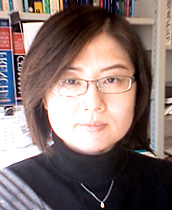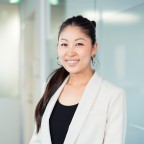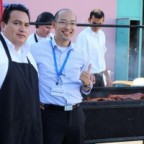Professor Mitsuyo Sakamoto grew up in Canada. Due to the influence of being born in a multicultural country, she started to have an interest in language which later pushed her to pursue her career as a linguist. She finished her B.A. and afterward completed her Ph.D. at the University of Toronto. Her areas of interest are Bilingualism, Language acquisition, maintenance and attrition, Second and third language acquisition, Foreign language pedagogy, Sociocultural theory and SLA, Qualitative research, Multiculturalism and multicultural education.
Recently, she sat down with the editors of the student journal Angles, to discuss her career, her work, and her teaching.
Angles Editor: How did you get started in your field?
Professor Sakamoto: I grew up in Canada which is a very multilingual, multicultural country. I had to grow up as a bilingual, so essentially my research fields are bilingualism and language maintenance. I was interested in pursuing what I had to go through, and Canada (specifically Toronto)  provided a perfect environment to pursue my studies in the area.
provided a perfect environment to pursue my studies in the area.
Angles Editor: What was the biggest challenge you had early in your academic career?
Professor Sakamoto: Well, first of all, I began as a Japanese language instructor back in Canada. And as you know, Japanese is not a very widely studied language in North America, so, given the linguistic hierarchy, Japanese did not enjoy a higher status compared to things like French or Spanish. and so the people’s public interest in Japanese was lower than I hoped.
Angles Editor: How did you overcome those challenges?
Professor Sakamoto: I never overcame that challenge. By becoming an English teacher here in Japan, I find that the way the society appreciates my contribution is totally different from the way the Canadian society appreciated my Japanese knowledge, which was quite daunting.
Angles Editor: Is there another motivation that made you change your career from Japanese instructor to English instructor/linguist?
Professor Sakamoto: I’ve always been a language buff. I’ve studied several different languages as I grew up so I wanted to become a language expert. It didn’t really matter to me which language I was teaching as long as it had to do with a language, so back in Canada it was Japanese and here it happens to be English.
Angles Editor: What new ideas or recent discoveries in your field excite you the most?
Professor Sakamoto: I’m really intrigued by the notions of postmodern thinking. When I was your age I used to believe that there was only one real truth and we need to be objective and so forth but now in recent years I have come to espouse more subjectivity, diversity, multiple interpretations; those ideas excite me.
Angles Editor: Do you think those findings of yours have something to do with your expertise, linguistics?
Professor Sakamoto: Within linguistics, my background is in bilingualism and I’ve come to appreciate how bilinguals have very complicated notions. Bilinguals are misunderstood as having two monolingual brains in one person but that’s not the case at all. The kind of identity that a bilingual takes up depends on a particular situation, who he or she is speaking with and in what context. All of that gives rise to a particular identity formation, which is quite exciting. Right now, I’m speaking to you in English so perhaps my persona is more the Canadian side in me, that’s emerging now, but a few minutes ago we were talking in Japanese and then maybe my Japaneseness emerged. It depends on the situation and I think that’s exciting and interesting to think about. However, when I say my Canadian side or my Japanese side is coming up, it doesn’t mean that my Japanese side is totally dormant while I’m speaking in English. It’s there but my English has a taint of Japaneseness and my Japanese probably has a taint of English. So, in that sense, they are not completely separated.
Angles Editor: What kind of discoveries do you want to make in the future?
Professor Sakamoto: The trend today is to celebrate bilingualism or multilingualism, which is great. I don’t have anything against that, but at the same time when we do that, people who didn’t quite succeed and retain their language blame themselves or their parents. I don’t like how people are perceiving these group of people as failures. I don’t think that’s the case. Going back to what I said, you cannot separate two languages or two cultures completely. If that’s the case, people who might not have retained their language – but I think the cultural knowledge is still there – their cultural practices are still there and their appreciation for the other culture are all there. I want to reduce the number of people out there who are becoming the scapegoat of bilingual/multilingual rhetoric. I don’t want them to feel that way. I’m just starting to work on a book which describes bilingualism not entirely in a rosy way that other books do, but provides a more detailed picture of who bilinguals are, and what kind of things they go through. There are good things and bad things. Just like anything else, there are two sides. I want to just fully describe bilinguals in a very fair, concrete way. I think it’s great that there are people out there who are aspiring to be bilinguals or multilinguals, but we are also kind of missing the other half of the picture.
Angles Editor: Could you tell us a little bit about your seminar, critical applied linguistics? How is it different from applied linguistics?
Professor Sakamoto: Applied linguists are interested in how people learn languages and, therefore, how best to teach language. That’s what our area is. But, critical applied linguistics questions many assumptions that are taken up in traditional applied linguistics. For example, who are language learners? Who are native speakers? What do we mean by second language? What do we mean by foreign language? What do we mean by mother tongue? It is said that communicative language teaching, task-based language teaching, and CLIL are very effective in teaching a foreign language, and chances are they truly are, but how do you explain the few who do not respond positively to those kinds of instruction? We question all the assumptions in traditional applied linguistics. So, our discussion tends to be very philosophical, it is very postmodern. We move away from modernism and liberalism. So, we espouse diversity, differences, and things like that.
Angles Editor: Is it difficult to teach critical applied linguistics?
Professor Sakamoto: The content is difficult, I agree. It’s so abstract and philosophical. I just came back from my seminar. There are seven students taking my seminar this year. Today, for example, the question was, “Are we using keigo to our superiors because they are already in a position of power, or is it the fact that we use keigo that creates that power imbalance?” And, we couldn’t come up with an answer. We were just discussing, going around in a circle, what about this, what about that. Although this class has the word ‘linguistics’ in it, it’s not so much linguistics we are focusing on. It’s how linguistics is being appreciated and understood, and what the weird things are about applied linguistics that are not really taken up in traditional discourse. So, we take those up, and we talk and talk. It’s very much discussion-based. I don’t have answers, and they don’t have answers. We just like to talk about it. So, if you are expecting things like” you are supposed to do this and this and this to teach a child”, this isn’t the course for you. This course tries to raise your awareness, asks students to look at our society; are there certain things that are strange now that you think about it? It’s commonsensical? It’s presented as commonsensical, ideological. But, if you stop and think about it, something is not right. For example, we were thinking about the word iku-men (育メン) in class today. You don’t say iku-women (育ウーマン), but you say iku-men. Why do you say iku-men? Because child rearing was traditionally done by women. And that was pre-given, that’s the commonsense. But, recently a small group of men are participating in child rearing, and they call for special attention. That’s why we devised the new word, iku-men. So, in our ideology, iku-men is something wonderful, great, but it’s something extraordinary. That’s why there is no world for women raising children, because it’s so ordinary for us. Same thing for kangofu (看護婦), career women (キャリアウーマン), OL (office ladies: オーエル), these words we use naturally. If you think about it, it’s shaping our cognition and ideology in a certain way. We take it for granted that it’s okay, but that’s why our society doesn’t change. But if we stop and think about it, there are things that are wrong with it. And if you are to change the language, we think that we can change our ideology, because we think that ideology is comprised by discourse.
Angles Editor: What are one or two texts or articles you would recommend to students interested in learning more about your specialty?
Professor Sakamoto: A book that I like and used as a textbook for my other class called Minority Language Education is called “Negotiating Identities” by Jim Cummins. And Jim Cummins was my thesis supervisor for my Ph.D. thesis. So, for Minority Language Education that is the textbook we use and people tend to like it. This course, compared to Critical Applied Linguistics, is more like traditional applied linguistics. The other book that I like is called “Alternative Approaches to Second Language Education”. It is an edited volume by Dwight Atkinson. It has the state-of-art approaches in applied linguistics. I was very excited to read this book. It is written by a lot of famous people, and it has a chapter on Sociocultural Theory, it has a chapter on Complexity Theory, and all these new things and recent stuff in applied linguistics are being put together in this book. It is also easy to read.
|
Recommended books (18:20-):
|
Angles Editor: How do you usually choose books? Do you have some tips on how we choose books?
Professor Sakamoto: There was a joke when I was a graduate student. They said, “Graduate students never read a book from page 1.” Instead, immediately you go to the back of the book to the reference list and look at the references first. And then you see Chomsky, for example, and if you like Chomsky, choose one from there. So, look in the reference list first; that is what I do. I choose books based on the writer because the writers signify a particular approach. I tend to like people who are associated with bilingualism and heritage language learning.
Angles Editor: What are the things that you want the students at the Department of English Studies to take away from studying in the department?
Professor Sakamoto: The fact that you learn English opens up new ways of thinking. So, I want them to become critical thinkers who question assumptions, appreciate different values and beliefs and be open-minded. And another thing I want my students to become is self-confident, and in order to get their confidence up, what I do is to give them lots of work to do, and what happens is that they do it and by the end of the year, their English is really good. They feel really great; I feel great; everyone is happy! Until we get there, we are all miserable, but once we get there we are very happy. For the English Skills class, because it’s a skills course, I try to get them to cultivate their skills. My other courses, Minority Language Education and Critical Applied Linguistics, are where I want people to question their assumptions, grow their critical thinking skills, and appreciate different values. That’s why my other courses are discussion-based, but this one (English Skills) is student-centered, lots of assignments, lots of reading, lots of writing, and lots of presenting.
Angles Editor: Do you think critical thinking is something that you can teach and we can learn?
Professor Sakamoto: I don’t think so. I give a material for the students to think about, and they have to think on their own. I don’t say “Think this way or that way.” I give material which I think is quite thought-provoking, but the rest is up to them. But I give them lots of pair-work time, so they talk to each other a lot. Because I think the students already bring knowledge and expertise to the classroom, so what I’m doing is just facilitating their exchange of whatever they already know, and they kind of improve each other by sharing their opinions. When you say something, the other person says, “Oh, that’s one way of looking at it;” and when the other person says something, you say the same thing. So, you are kind of affecting each other. That’s why in English Skills I always try to pair the students up with a different person; they don’t get to pair with their buddies all the time because I want them to exchange their opinions with as many different people as they can.
Angles Editor: What kind of impact or change do you want to have on education in Japan?
Professor Sakamoto: I think I’m too small a potato to bring about a social change of any kind. All I can fight for is to educate as many people and make sure that they are ready to go out in the real world and to make social contributions. That’s why the skit that we have to do for the English Skills’ very last assignment of the year is “Ten Years from Now: What Kind of Social Changes Would You Be Making?” I really push them to think. At that time, we could think only vaguely, but I ask them “What kind of husband would you have?” “How many kids would you have? How old would they be?” “Which school would they go to?” “What kind of job would you have?” “What time would you come home?” “What kind of dinner would you make?” You know, little things like that, and they get them to really think concretely so that they can envision what they are doing ten years from now. I don’t want them to be vaguely and pointlessly enjoying the four years and spend the four years without thinking about the future. Because this is a really good school and this is a really good department, being educated here, the society has certain expectations for you, and I want you to be ready for that. Imagine – graduating from the English Department of Sophia University, the society will think that you are totally fluent in English, you can write e-mails in English, and so forth. What is going to happen if you are not prepared for that?
Angles Editor: Any words of encouragement for the students here in Sophia?
Professor Sakamoto: “Study Hard. Play Hard.” I just want my students to live the fullest life they can have. And I always want my students to feel confident. If you spend a solid four years, I believe you will have a great sense of achievement by the time you graduate.
Professor Sakamoto teaches classes in English Skills, Critical Applied Linguistics and Minority Langauge Education. To learn more about her ideas, please take her courses or read her new co-edited book about the history of the TESOL programme at Sophia University.


















